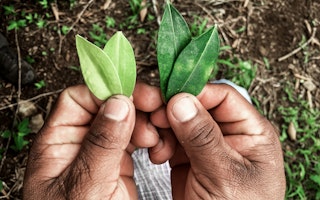Marijuana Reform Advocates Make History in Uruguay
By Catesby Holmes
On December 10, Uruguay voted to become the first country in the world to establish a legal, government-controlled marijuana market. The campaign was led by Regulación Responsible, a coalition of organizations and individuals that formed in support of the bill. I spoke with three members fresh on the heels of the Senate approval: Victoria Verrastro, Diego Pieri, and Sebastian Aguiar discuss their advocacy and the future of drug policy in Uruguay.
You were all there in the Senate when it passed the bill. How did it feel for years of work to culminate in a victory?
Sebastian Aguiar: We’ve really been working toward this for 15 years, strengthening and consolidating support. So, personally, at the moment of Senate approval, it was sort of hard for me to understand that it had really happened. I didn’t really start to grasp it until yesterday.
Diego Pieri: The session was really long. It started quietly in the morning with some parliamentary discussion, but later in the day the people from the marijuana march, 4,000 of them, gathered outside the doors of Parliamentary Palace. At 10 or 10:30 p.m. when voting finally ended, there was so much excitement, and we went to join all our friends and allies to celebrate.
Victoria Verrastro: Yes, even the best novelist couldn’t have written a better ending to the day!
What are the most important points of the cannabis regulation law?
DP: There will be a maximum of 40 grams allowed per person, per month, for Uruguayan residents over the age of 18. There are three ways to access the product: first, autocultivo, or cultivation for individual consumption; second, collective cultivation, or cannabis clubs; or via a cultivation system that the state will control through production licenses, a distribution system, and a system of sales in authorized pharmacies.
SA: Advertising is prohibited, as is driving under the influence and sales to minors. It promotes prevention campaigns and requires educational programs.
How was your relationship with the government during this process?
VV: We maintained our independence as a civil society organization, but we’re not obtuse—we know how important it is to have inter-institutional linkages and networks. We had a relationship of trust with the government, and part of that means being able to criticize sometimes.
ProDerechos was a leading force in Regulación Responsable, of which you are also members. When did the group decide to get involved in this major political battle, and what changed as a result?
SA: This is not our first campaign. We were very involved in other recent progressive reforms, such as gay marriage and abortion. So we knew we had the potential. It’s true that the level of professionalism is higher now, but I see it as a continuum, with 2012 as the turning point when we became almost exclusively devoted to the cause.
VV: There’s a correlation between the growth of ProDerechos and our personal growth. It’s been ten years of our lives—a period in which we’ve gotten our degrees, met life partners, studied abroad, come back. So it has grown with us as we’ve developed, finishing our studies and starting formal jobs.
How do you explain why Uruguay, a small country of 3.5 million people, is such a pioneer in progressive social reform—the first to separate church and state, to legalize divorce, gay marriage, and abortion, and, now, to legalize marijuana?
VV: People talk about a “Uruguayan miracle” or whatever, but we worked for this [laughs]. We had some luck, yes, but mostly it was hard work, creativity, and courage.
But I think there are many factors. It couldn’t have happened without a progressive government, the Frente Amplio. Uruguay’s size, I think, allows us to be innovative. Uruguay is also in a good political, economic, and social moment—unemployment here is very low right now, so once you resolve these economic concerns of people, you can begin looking at other issues.
How will you judge the success of this law in the coming years?
VV: We need to see the rapid development of the state’s capacity to respond to the law’s demands—which are to create a non-state organization able to exert control over marijuana. [The state] should be respected, generate trust in people, and have the capacity to overcome challenges. We should also see low levels of corruption all around and good indicators in the area of insecurity.
DP: The main objective of the law as the state framed it is to eliminate narcotrafficking. We’re optimistic it will achieve that. But we are more ambitious—we also want the new marijuana production chain to be beneficial for poorer segments of society, to become a sustainable business for small producers of limited resources, to generate sustainable development in different sectors of the country.
Across Latin America, the drug policy debate is gaining steam. How do you think Uruguay’s legalization will impact the region?
VV: We hope it will be a model for other places, to create a domino effect on the continent. Uruguay is small, but we’re right next to Brazil and Argentina, which makes this influential. So part of our responsibility is to share this experience—we’re at everyone’s service from now on to accompany other reform processes happening in other countries.
What new advocacy issues are on the horizon?
SA: Regarding the regulation law, our two primary aims in 2014 are ensuring successful implementation and generating a production chain that supports national development. Other than that, our main goal is to organize against the baja la ley de imputabilidad, a proposal that would lower the age at which a juvenile may be convicted of a crime from 18 to 16. That would be a major setback that would generate a criminalization of youth, in particular the poorest sectors of society.
Anything else you’d like to add?
VV: It’s important to be grateful in life, that’s what my grandfather always said, and the truth is we have so many people to thank for this, from OSF and the Drug Policy Alliance to all our Latin American allies who wrote us letters and tweets of congratulations this week.
SA: This campaign was exhausting, but it has also been so beautiful. All this work—it’s all been just precious.
ProDerechos is supported by the Open Society Foundations.
Until September 2016, Catesby Holmes was a senior program coordinator for the Open Society Latin America Program.

